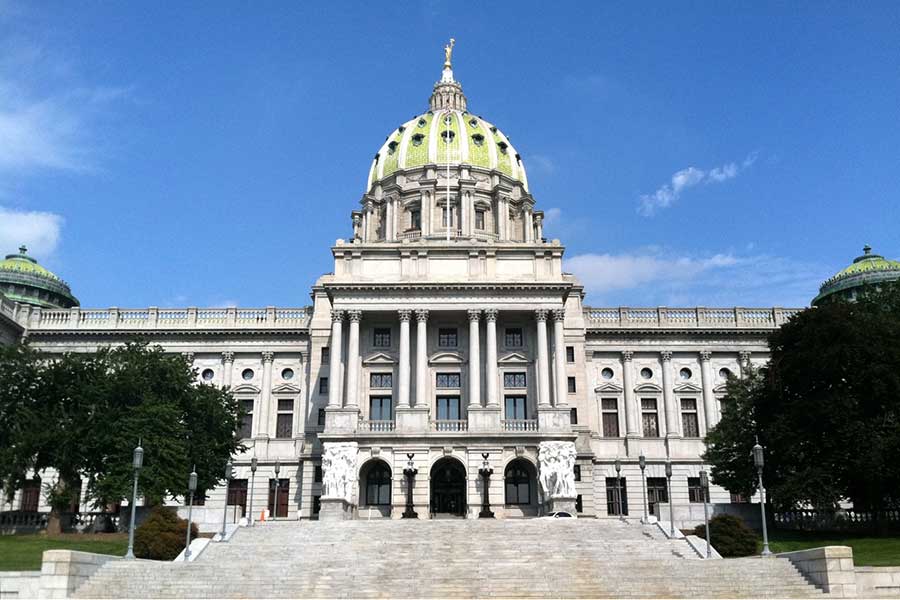The state Senate this week passed an amendment to an anti-trans bill that would limit the scope of its impact on trans youth enrolled in the state’s Children’s Health Insurance Program.
H.B. 1388 would have banned state funding for all trans-related health services within the state CHIP. But an Oct. 24 amendment limits the funding ban to gender-confirmation surgery; all other trans services, including counseling and hormone therapies, would be covered.
As of presstime, H.B. 1388 was scheduled for another vote in the full Senate before it’s sent to the state House for consideration.
CHIP provides health insurance for low-income children 18 and under.
Pennsylvania spent about $48.5 million to support CHIP last year. About 177,000 children are served in Pennsylvania.
H.B. 1388’s main purpose is to continue state CHIP funding for another two years. Without its passage, funding would end in December.
On Oct. 18, during a state Senate Banking and Insurance Committee meeting, Sen. Donald C. White (R) introduced his initial amendment to H.B. 1388, banning state funding for all trans-related health services within CHIP.
At that meeting, all five Democratic state senators voted against the amendment in a 10-5 vote. But in a follow-up vote to release the bill from the committee, only state Sen. Lawrence M. Farnese Jr. (D) voted against its release.
On Oct. 24, during a full state Senate session, White introduced an alternate amendment that only bans funding for gender-confirmation surgery, which was approved by a vote of 32-18.
State Sen. Sharif Street (D) voted against White’s Oct. 24 amendment.
“The only thing this bill does is send a message to trans kids that they’re not as good as other kids,” Street told PGN. “That’s not right and that’s why I opposed it. Not to mention it’s also in violation of federal law and could jeopardize funding for all children in the state’s CHIP program.”
Shortly before White’s Oct. 24 amendment, Pennsylvania Youth Congress sponsored an event in the state Capitol Rotunda. Numerous participants denounced H.B. 1388.
Trans man Noah Thompson called the bill “cruel and unusual,” and said it would contribute to increased suicides among trans youths. Trans woman Jenny Cory noted that “being a minority doesn’t make someone any less of a citizen.”
Deb Toothman, parent of a trans child, added, “This must stop. No child should be treated as less than they are. Transgender is not a choice and neither is health care.”
Nicole Miller, who lost a son to suicide, said: “We need growth and understanding from our legislators. These are our kids and we will fight like hell for them.”
Trans woman Ciora Thomas posed, “Why are politicians making decisions without trans people in the room? We need more inclusivity. Let’s keep on the good fight of protecting our trans community.”
Sarah Boateng, a state health official, read a message from Gov. Tom Wolf, in which he vowed to veto H.B. 1388 if it reached his desk with the Oct. 18 anti-trans language.
After the event, participants visited the offices of various state senators.
An estimated 800 children in Pennsylvania are receiving trans-related medical services but it’s not clear how many of them are enrolled in CHIP.
In an interview with PGN, Dane E. Menkin, a nurse practitioner at Mazzoni Center, commended Wolf for vowing to veto H.B. 1388 if it reached his desk with the Oct. 18 anti-trans language.
As a clinician at Mazzoni, Menkin provides services to numerous trans children.
“Plain and simple, this is the wrong place for legislators to meddle,” Menkin told PGN. “This is something that needs to be done privately between parents, children and health-care providers. So I commend Gov. Wolf for his ongoing support of the LGBT community as a whole and, with regard to this bill, the trans community specifically.”
Trans attorney Julie Chovanes echoed Menkin’s sentiments.
“We appreciate the governor’s recognition that trans rights are basic human rights,” Chovanes said in an email. “As the governor should know — at least since the commonwealth settled our lawsuit against Pennsylvania for trans rights under Medicaid, which eliminated the prior ban against trans care — trans discrimination is illegal, and any attempt to discriminate against us again as in H.B. 1388 would be found to be willful discrimination, with attendant enhanced damages and other relief.”

